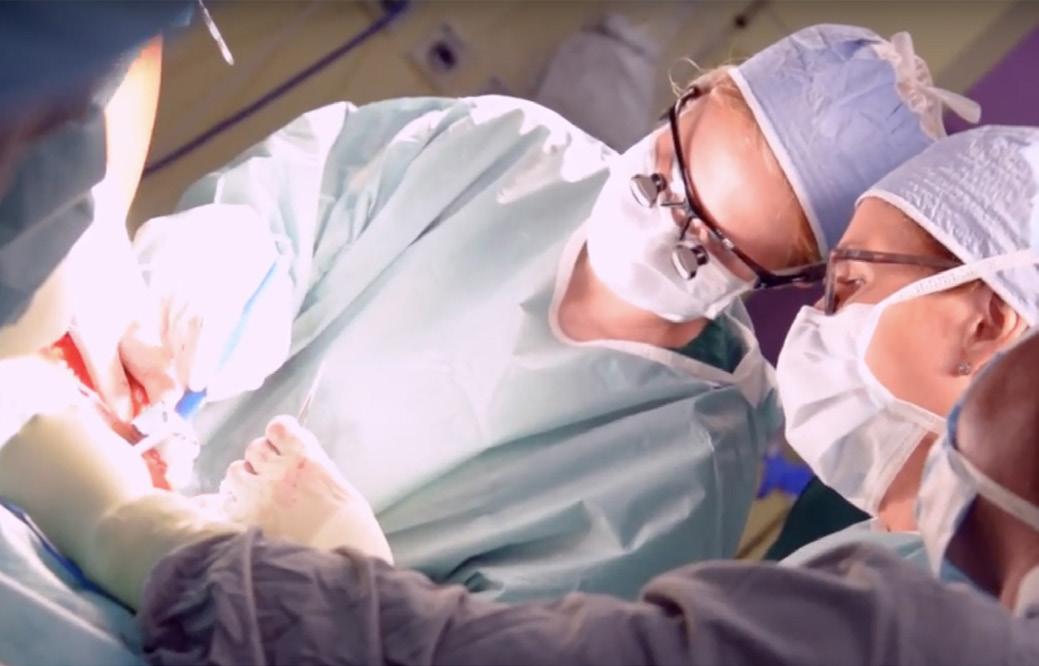
3 minute read
Working toward global education for a universal theme
By Andrea Pusic, MD, MHS The PSF President
Having traveled around the world and performed breast reconstruction
in several countries, I know there’s a universal theme for women at the time of a breast-cancer diagnosis. No matter where she might live, a woman who receives the diagnosis typically has this initial thought: “I don’t want to die of this.” The second thought is: “I don’t want to lose my breast.” Survival is paramount, but there are benefits to being able to offer options that make a breast-cancer diagnosis a little less frightening.
Through various organizations, I’ve traveled to help teach breast reconstruction and other reconstructive procedures in India and Bangladesh for more than 10 years, and in East Africa for about five years now. In fact, as I write this piece, I’m preparing to board a flight for a surgical effort in Dar es Salaam in Tanzania. Although these trips reinforce the fact that there are many areas throughout the world where women struggle to get basic healthcare, there is a global desire for more advanced reconstructive surgery techniques, such as breast reconstruction.
Offering breast reconstruction in low- and middleincome countries has some important benefits that may not be immediately obvious. We know, for instance, that women in Africa typically present with breast cancer at a later, more advanced stage. That can be for a variety of factors: It could be related to financial means, poor physician access or, in many cases, fear. They know that if they go to the doctor and it’s cancer, the breast will be amputated and there’s no recourse beyond that. It’s the end of the story from a body-image perspective. Additionally, there’s the social factor in terms of women feeling that their role in their marriage, family or society is a little less secure as a result of mastectomy. It could mean the loss of a husband or other concerns about abandonment. We did a study recently and interviewed women in Tanzania and there was a strong sense that fear of mastectomy was an important factor behind delaying treatment – these women knew that mastectomy would be recommended and sought to delay as long as possible.
Offering breast reconstruction in East Africa or India isn’t about being able to offer it to every single woman. It probably isn’t the right choice for everyone, and from a
Dr. Pusic (right) operating in Tanzania. Photo courtesy of Aga Khan Development Network
resource perspective, it’s probably impossible. Nevertheless, we can raise awareness that breast reconstruction is a possibility. Yes, a breast cancer diagnosis may mean mastectomy initially, but it could also lead to reconstruction. Our efforts center on educating the local community with the hope that those who might not otherwise seek treatment might feel more comfortable coming forward.
Beyond helping an individual woman, these efforts all help skill-building efforts in East Africa and India so that plastic surgery capacity grows locally. As an example, for a woman in Dar es Salaam who had a mastectomy five years ago, I performed a reduction of the breast. In her situation, she was literally listing to one side because the remaining breast was so heavy. She’d developed neck and back pain from being so off-kilter. That simple breast reduction is the kind of short-case procedure that can be easily taught to a local general surgeon and it has a very significant quality-oflife benefit.
While I wouldn’t say the change over the years has been sweeping, you can see our efforts taking root. Year after year, we’ve held press conferences and you can see the level of discussion is growing. Nevertheless, there’s a long way to go. Keep in mind that a woman who has early-stage breast cancer in the United States would likely be a candidate for keeping her breasts, followed by lumpectomy and radiation. Many of these other countries don’t have access to radiation, so breast cancer automatically equals mastectomy.
Nevertheless, these trips keep me conscious of the solidarity among women globally. We have common emotions and common concerns. Personally, it’s incredibly










